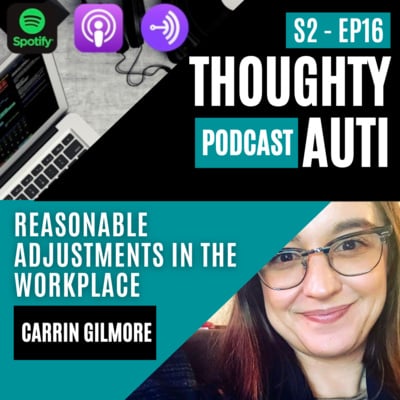

What reasonable adjustments can you get in the workplace? Why do we have a Deficit Model? How can you advocate for your needs?
Carrin M. Gilmore (@letstalkaboutautism) is an Autism advocate offering Advocacy Accommodations sessions and support for parents and their children in developing IEP (Individual Education Plans). Working closely with Carole Whittington at Mind Your Autistic Brain, Carrin and the team seeks to bring greater inclusivity in the workplace, help neurodivergent couples connect on a deeper level and support neurodivergent individuals in their unmasking journey.
Carrin's Links - https://linktr.ee/CarrinMWAut // My Links - https://linktr.ee/thomashenleyUK
Originally an English teacher, Carrin seeks to bridge the gap between deficit models in the workplace and person-centred models in education. They talk about the various accommodations one can expect in the workplace, one of which is being fired (yes... you read that right, it's actual advice for workplaces!).
Thomas and Carrin paint a picture of the individuals who deal with the hand they are dealt in the workplace, highlighting the daily issues with energy, sanity and time management that could be avoided with accommodations. The system works using a Deficit Model, rather than a Strength-Based Model, providing cookie-cutter, blanket solutions for each and every individual - but needs are a spectrum.
Thomas raises the common charity-based thinking around employing Autistic people, with both offering their takes on the benefits these individuals have for businesses... beyond 'charity'.
Carrin lists some common adjustments: Work coaches, giving adequate processing time, clear and concise language, lists/bullet point instructions and CLEAR lines of communication for certain issues. However, these are NOT mandatory and even if they are met, positive adjustments offered the clearest path for Thomas' long-term employment success.
At the end of the day, the employment rates for autistic people are depressing at least, but there are gems out there who are willing to go the extra mile for their employees who are willing to work with them cooperatively and with the understanding that support is a two-way street.
Song Of The Day (Listen Here) - https://open.spotify.com/playlist/5UDIyN5TSYN4zMcRoQPrG8?si=9255ed3480d840b5
Interview me, 1:1 Autism coaching, public speaking for events, workplace training - https://www.thomashenley.co.uk

What reasonable adjustments can you get in the workplace? Why do we have a Deficit Model? How can you advocate for your needs?
Carrin M. Gilmore (@letstalkaboutautism) is an Autism advocate offering Advocacy Accommodations sessions and support for parents and their children in developing IEP (Individual Education Plans). Working closely with Carole Whittington at Mind Your Autistic Brain, Carrin and the team seeks to bring greater inclusivity in the workplace, help neurodivergent couples connect on a deeper level and support neurodivergent individuals in their unmasking journey.
Carrin's Links - https://linktr.ee/CarrinMWAut // My Links - https://linktr.ee/thomashenleyUK
Originally an English teacher, Carrin seeks to bridge the gap between deficit models in the workplace and person-centred models in education. They talk about the various accommodations one can expect in the workplace, one of which is being fired (yes... you read that right, it's actual advice for workplaces!).
Thomas and Carrin paint a picture of the individuals who deal with the hand they are dealt in the workplace, highlighting the daily issues with energy, sanity and time management that could be avoided with accommodations. The system works using a Deficit Model, rather than a Strength-Based Model, providing cookie-cutter, blanket solutions for each and every individual - but needs are a spectrum.
Thomas raises the common charity-based thinking around employing Autistic people, with both offering their takes on the benefits these individuals have for businesses... beyond 'charity'.
Carrin lists some common adjustments: Work coaches, giving adequate processing time, clear and concise language, lists/bullet point instructions and CLEAR lines of communication for certain issues. However, these are NOT mandatory and even if they are met, positive adjustments offered the clearest path for Thomas' long-term employment success.
At the end of the day, the employment rates for autistic people are depressing at least, but there are gems out there who are willing to go the extra mile for their employees who are willing to work with them cooperatively and with the understanding that support is a two-way street.
Song Of The Day (Listen Here) - https://open.spotify.com/playlist/5UDIyN5TSYN4zMcRoQPrG8?si=9255ed3480d840b5
Interview me, 1:1 Autism coaching, public speaking for events, workplace training - https://www.thomashenley.co.uk




















